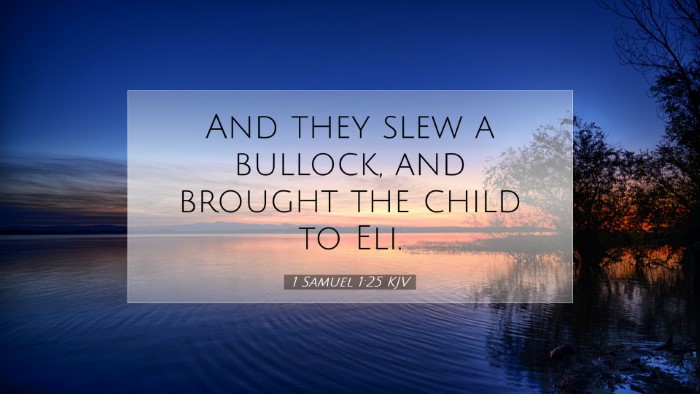Bible Commentary on 1 Samuel 1:25
Verse Context: In 1 Samuel 1:25, we find Hannah presenting her son Samuel to Eli after weaning him, signifying an act of dedication and fulfillment of her vow to God. This passage marks a crucial moment in Hannah's narrative, reflecting her faith, commitment, and the significance of Samuel's future role in Israel's history.
Commentary Insights from Matthew Henry
Matthew Henry notes that Hannah's presentation of Samuel is a profound expression of gratitude. After enduring years of barrenness and the distress caused by Penninah, Hannah finally receives her long-desired son. Her actions are steeped in an understanding of divine providence and the importance of dedicating children to the Lord.
Henry emphasizes the importance of fulfilling one's vows to God, which Hannah exemplifies through her actions. He observes that when we receive blessings from God, our response should be one of worship and dedication. In Hannah's case, this was not a mere formality, but a heartfelt expression of her commitment to God, demonstrating her understanding that all good gifts come from Him.
Moreover, Henry suggests that Hannah serves as a model for parents, illustrating the need for dedication in the upbringing of children. He stresses that children, like Samuel, are entrusted to parents for a time, and it is crucial for parents to recognize their role in guiding their children toward a life that honors God.
Commentary Insights from Albert Barnes
Albert Barnes highlights the significance of Samuel's name, which means "asked of God." He draws attention to the fact that Hannah's prayers were not only heard but answered directly. The act of bringing Samuel to the temple represents the fulfillment of her promise to God and serves as a testimony to the power of fervent prayer.
Barnes elaborates on the cultural and religious context of the time, noting that dedicating a child to God was a common practice among the faithful in Israel. This act demonstrated a recognition that children are a gift from God and that dedicating them back to Him signifies an acknowledgment of divine sovereignty over life and family.
He also emphasizes the communal aspect of Hannah's dedication, suggesting that by presenting Samuel to the Lord, she was inviting the entire community into the narrative of God's faithfulness. It reinforced a collective recognition of God's mercy and grace, as well as a commitment to support the spiritual upbringing of Samuel as he prepared for his significant role in Israel.
Commentary Insights from Adam Clarke
Adam Clarke offers a detailed analysis of the text, commenting on the emotional weight of Hannah's decision to present Samuel to Eli. Clarke highlights the sacrificial aspect of her dedication, noting that it involved letting go of her beloved son after years of longing for him.
Clarke points out that this moment was not merely a religious duty, but an act of profound faith. Hannah recognized that her son belonged to God and that submitting him to God's service was the highest expression of her gratitude. He encourages readers to examine their own dedication and commitment to God, particularly regarding the sacrifices they may need to make in their spiritual journeys.
Furthermore, Clarke emphasizes the prophetic implications of Samuel's life, suggesting that Hannah's act of dedication set the stage for a transformative period in Israel's history. He notes that Samuel would grow to become a pivotal figure, serving as a prophet and judge, leading Israel back to faithfulness and away from the corrupt practices that had overtaken them.
Theological Reflections
The act of dedicating Samuel to the Lord invites theological reflection on the nature of commitment and sacrifice in the life of a believer. It illustrates the principle that our responses to God's blessings should involve stewardship, gratitude, and a willingness to align our priorities with God's purposes.
- Commitment to God: Hannah’s actions teach us about the importance of committing our lives and our families to God's service.
- The Power of Prayer: The narrative reinforces that prayer is potent and that God responds to the cries of His people.
- Parenting in Faith: Parents are reminded of their role in guiding their children towards a relationship with God, echoing the significance of early spiritual formation.
- Covenantal Relationships: Hannah’s vows reflect the nature of covenants in Scripture, where human commitments align with divine promises.
Application for Pastors and Theologians
This commentary on 1 Samuel 1:25 serves as a rich resource for pastors and theologians seeking to draw practical applications from Hannah's story. They can glean insights into the significance of personal sacrifice in ministry and the necessity of fulfilling one's vows to God as a reflection of a faithful life.
Pursuing a deeper understanding of dedication in ministry, leaders can reflect on how they are nurturing the next generation of leaders in their congregations. This passage encourages a commitment to foster spiritual growth, emphasizing the importance of creating a culture within the church that honors God's role as the giver of all blessings.
As Hannah dedicated Samuel, ministers are called to dedicate their time, talents, and resources to building a community of faith that is responsive to God's calling, setting an example for congregants in how they may also dedicate their lives to God's service.


